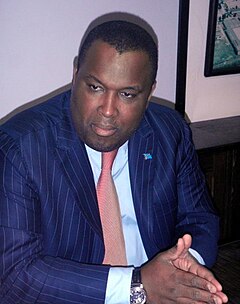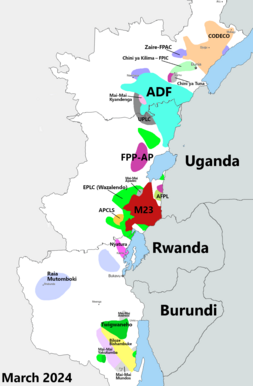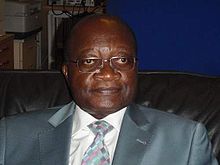The Armed Forces of the Democratic Republic of the Congo is the state organisation responsible for defending the Democratic Republic of the Congo. The FARDC was rebuilt patchily as part of the peace process which followed the end of the Second Congo War in July 2003.

Joseph Kabila Kabange is a Congolese politician who served as President of the Democratic Republic of the Congo between January 2001 and January 2019. He took office ten days after the assassination of his father, President Laurent-Désiré Kabila. He was elected as president in 2006 and re-elected in 2011 for a second term. Since stepping down after the 2018 election, Kabila, as a former president, will be a senator for life, according to the Constitution of the DRC.

Léon Kengo wa Dondo is a Congolese politician who served as the "first state commissioner" several times under Mobutu Sese Seko in Zaïre. He was one of the most powerful figures in the regime and was a strong advocate of economic globalization and free-market economics. He served as President of the Senate of the Democratic Republic of the Congo from 2007 to 2019.

Lubumbashi is the second-largest city in the Democratic Republic of the Congo, located in the country's southeasternmost part, along the border with Zambia. The capital and principal city of the Haut-Katanga Province, Lubumbashi is the center of mining in the region, acting as a hub for many of the country's largest mining companies. No definite population figures are available, but the population of the city's urban area is estimated to be around 2.5 million in 2020.
Antoine Ghonda Mangalibi was the foreign minister of the Democratic Republic of the Congo from June 30, 2003, until July 23, 2004.
The Movement for the Liberation of the Congo is a political party in Democratic Republic of the Congo. Formerly a rebel group operating in the Democratic Republic of Congo that fought the government throughout the Second Congo War, it subsequently took part in the transitional government and is one of the main opposition parties.

Antoine Gizenga was a Congolese (DRC) politician who was the Prime Minister of the Democratic Republic of the Congo from 30 December 2006 to 10 October 2008. He was the Secretary-General of the Unified Lumumbist Party.
Azarias Ruberwa Manywa is a Congolese politician, lawyer, and public figure. During the Second Congo War he was Secretary-General of the Rassemblement Congolais pour la Démocratie (RCD-G) rebel group. Following the war he was one of the vice-presidents in the transitional government of the Democratic Republic of the Congo between 2003-2006. He has also been the leader and president of RCD-G's political party since 2003. He is a member of the Banyamulenge community of South Kivu who belong to the Tutsi tribe.

François-Joseph Mobutu Nzanga Ngbangawe is a Congolese politician. A son of the long-time President Mobutu Sese Seko, he served in the government of the Democratic Republic of the Congo under President Joseph Kabila from 2007 to 2011, initially as Minister of State for Agriculture and subsequently as Deputy Prime Minister for Basic Social Needs. He was dismissed from the government in March 2011. In 2008, he founded the Union of Mobutist Democrats as the successor to his father's Popular Movement of the Revolution and has led the party since.

General elections were held in the Democratic Republic of the Congo on July 30, 2006. They were the first multiparty elections in the country in 41 years, and the first since the overthrow of longtime leader Mobutu Sese Seko nine years earlier. Voters went to the polls to elect both a new President of the Republic and a new National Assembly, the lower-house of the Parliament.

Vital Kamerhe is a Congolese politician who is the chief of staff of President Félix Tshisekedi and leader of the Union for the Congolese Nation (UNC) opposition party. Previously he was the President of the National Assembly of the Democratic Republic of the Congo from 2006 to 2009. After resigning from that office, he went into the opposition and founded the UNC. Kamerhe was a candidate in the 2011 presidential election. In 2018 Kamerhe supported Félix Tshisekedi for president and was made his chief of staff after the election.

The Kivu conflict began in 2004 in the eastern Congo as an armed conflict between the military of the Democratic Republic of the Congo (FARDC) and the Hutu Power group Democratic Forces for the Liberation of Rwanda (FDLR) in the Democratic Republic of the Congo. It has broadly consisted of three phases, the third of which is an ongoing conflict. Prior to March 2009, the main combatant group against the FARDC was the National Congress for the Defence of the People (CNDP). Following the cessation of hostilities between these two forces, rebel Tutsi forces, formerly under the command of Laurent Nkunda, became the dominant opposition to the government forces.

The Republican Guard of the Democratic Republic of the Congo, formerly known as the Special Presidential Security Group, is maintained by President Félix Tshisekedi. Military of the Democratic Republic of the Congo (FARDC) military officials state that the Garde Républicaine is not the responsibility of FARDC, but the Head of State. Apart from Article 140 of the Law on the Army and Defence, no legal stipulation on the DRC's Armed Forces makes provision for the GR as a distinct unit within the national army. In February 2005, President Joseph Kabila passed a decree which appointed the GR's commanding officer and 'repealed any previous provisions contrary' to that decree. The GR is more than 10,000 strong, and formerly consisted of three brigades, the 10th, at Kinshasa, the 15th, and the 16th, at Lubumbashi. It has better working conditions and is paid regularly, but still commits numerous crimes near their bases, including against United Nations officials.
General John Numbi is a Congolese military officer. Until January 2010, he was the Inspector General of the Congolese National Police. In 2018 he was appointed as the Inspector General of the Armed Forces of the Democratic Republic of the Congo (FARDC).
The Democratic Republic of the Congo (DRC) is a source and destination country for men, women, and children subjected to trafficking in persons, specifically conditions of forced labor and forced prostitution. The majority of this trafficking is internal, and much of it is perpetrated by armed groups and government forces outside government control within the DRC's unstable eastern provinces.
Emile Christophe MOTA NDONGO is the former minister of Agriculture, livestock and fishery of the Democratic Republic of Congo. he is also the acting president of Regional Fisheries Commission of the Gulf of Guinea, COREP. He is also a member of the national parliament of the Democratic Republic of the Congo. and the former chief of cabinet of the late president of the Congo, Laurent-Désiré Kabila. He was born on the 5 May 1956 in the Katanga province.
The Land Forces, also called the Congolese Army, are the land warfare component and the largest branch of the Armed Forces of the Democratic Republic of the Congo (FARDC).

The Katanga insurgency refers to the ongoing rebellion by a number of rebel groups in the Democratic Republic of the Congo, some of which aim for the creation of a separate state within Katanga. While the insurgency has been active in various forms since 1960, insurgent groups have recently redoubled their efforts after the 2011 jail break that freed Gédéon Kyungu Mutanga, who commanded the majority of the Katangese separatist groups until his surrender to Congolese authorities in October 2016.
The following lists events that happened during 2005 in the Democratic Republic of the Congo.

Army General Célestin Mbala Munsense is a Congolese military officer who has served as the Chief of Staff of the Armed Forces of the Democratic Republic of the Congo (FARDC) since 14 July 2018. He is considered a loyalist of President Joseph Kabila and held a number of high ranking posts in the presidential and military administration prior to his appointment, replacing Army General Didier Etumba as Chief of Staff of the Armed Forces. Before that, he was a long time Chief of Staff to the President's office, since at least 2010, as a brigadier general. In September 2014, during Kabila's restructuring of the army, Mbala was a major general and was appointed as Deputy Chief of Staff for Administration and Logistics.











